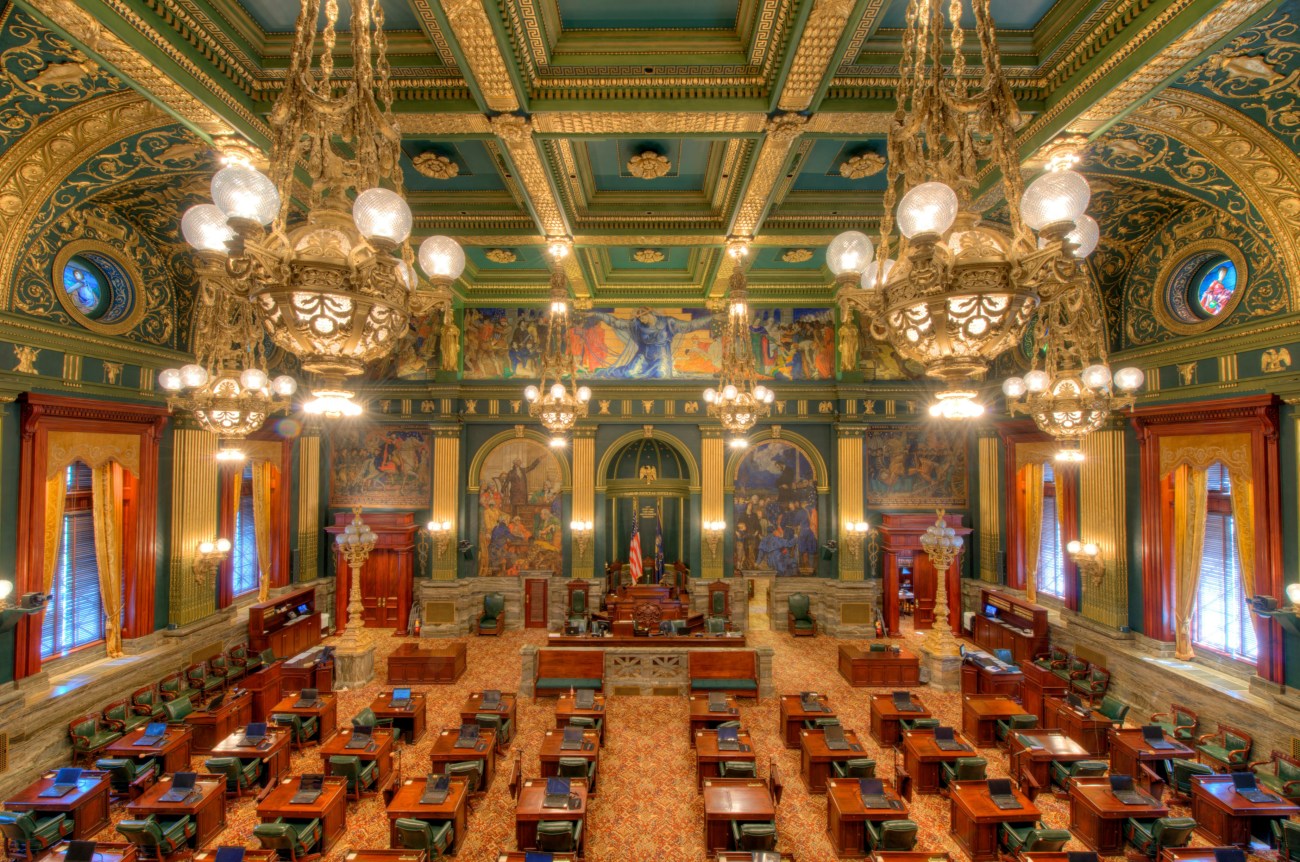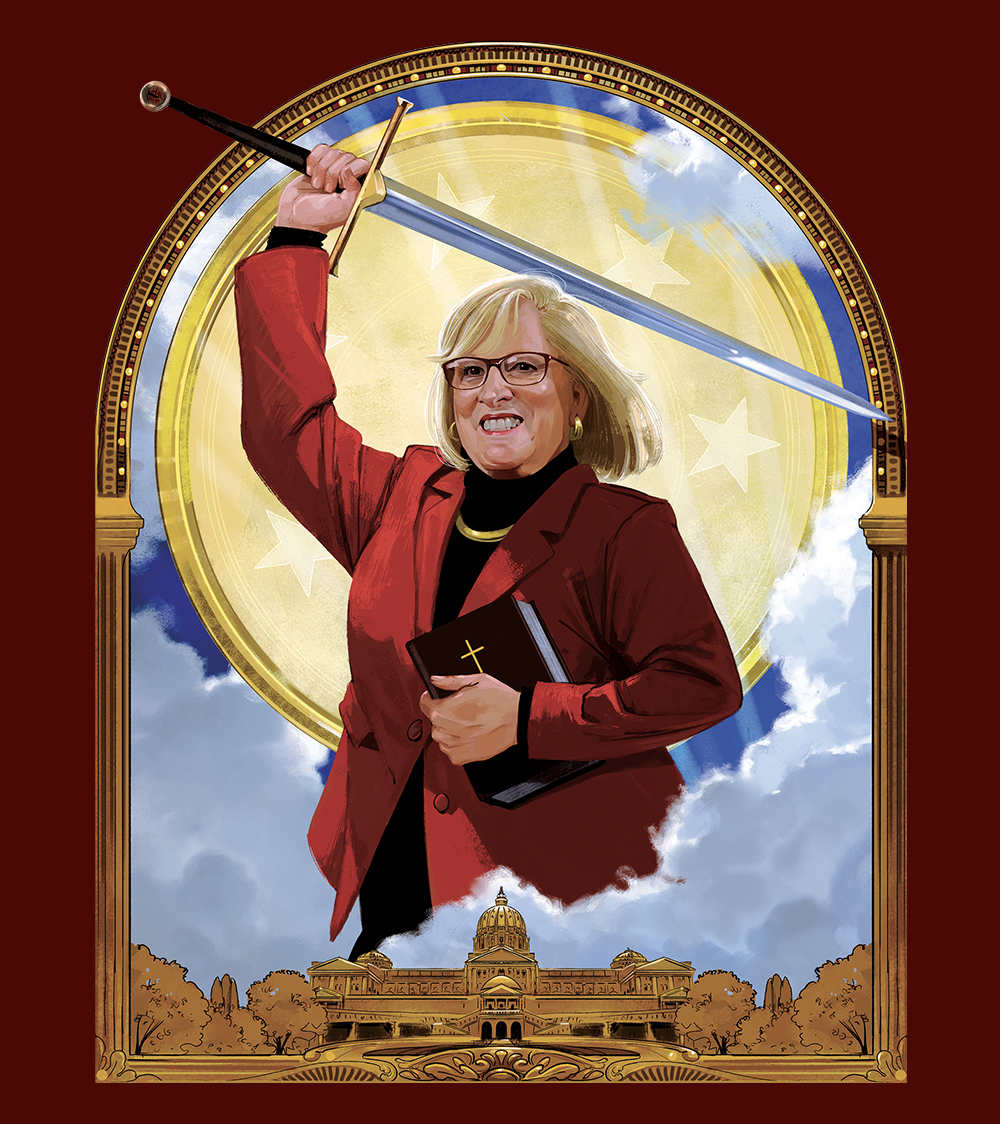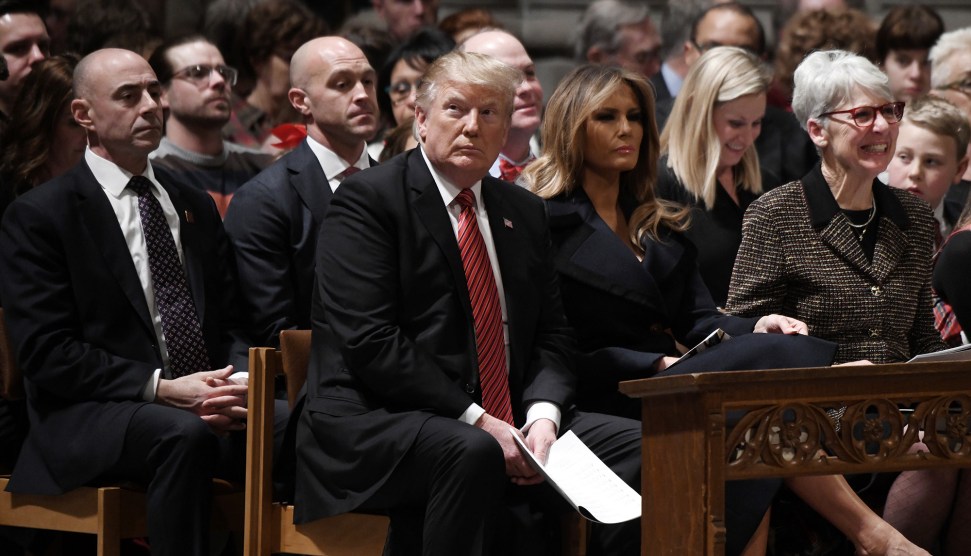Every Monday, Abby Abildness leads her “Penn’s Sacred Challenge Tour,” a guided walk through the Pennsylvania Capitol in Harrisburg. On the day I join, a group of stylish and well-behaved Christian homeschoolers trail her through marbled hallways, beneath mosaic ceilings, and past stained-glass windows, dissecting the early-20th century art for hidden meanings, like a Christian nationalist Da Vinci Code.
“God’s message is on the walls,” she says, directing our eyes to Edwin Austin Abbey’s “Spirit of Light,” a fresco of semi-nude nymphs silhouetted against burning oil derricks, each holding their own flame. “Doesn’t this remind you of Pentecost?” she asks the students.

To Abildness, the building’s art doesn’t just transmit Pennsylvania’s founding myths—it reveals her state’s, and the nation’s, true Christian origins. The fresco is not only an homage to Pennsylvania’s role in birthing the oil industry, she says, but a call for spiritual light to be “taken to the nations as a holy example.” Abildness traces her particular proclamations back to William Penn, a freethinking Quaker whom she and many other evangelicals have rebranded as “America’s founding grandfather,” pointing to his 1681 pronouncement that the territory he’d been granted would be a “holy experiment” and the “seed of a nation.”
Scholars have long interpreted Penn’s statement as an endorsement of religious freedom: In contrast to the Puritan settlers of New England, Penn, who’d also faced persecution, wanted his new province to be a sanctuary for many faiths. But who cares about the history? As an anointed apostle of a growing charismatic movement known as the New Apostolic Reformation, Abildness appropriates Penn to underpin a Christian nationalist vision that enshrines her faith above all others.
Like many in the movement, Abildness (who doesn’t care for the NAR label, which is more consistently embraced by academics) insists she’s building a peaceable kingdom, one where other sects and non-Christians would “be safe in the sense that they wouldn’t be persecuted—they wouldn’t be put in jail.” But many adherents, believing modern-day prophets—Abildness included—walk among us, have pledged to take control of the “Seven Mountains of Influence”: government, education, media, family, entertainment, religion, and business. In leaked footage of a prayer meeting she led, Abildness explains that “Pennsylvania is the kingdom shift state, the governmental shift state”—the place where “biblical values, if planted, will grow across the world” and hasten Christ’s return.
The tour done, she leaves for a weekly closed-door prayer session held with Republican state lawmakers and other notables in a conference room beneath the rotunda. During one of my Capitol visits, Carla Sands, Donald Trump’s ambassador to Denmark, sat in. One regular attendee is state Sen. Doug Mastriano, who promised to host the group in the governor’s reception room once he won his 2022 bid for the office. (He lost.) Other state lawmakers who frequently participate include Sen. Cris Dush, who is pushing to eliminate mail voting; Rep. Stephanie Borowicz, whose bill modeled after Florida’s “Don’t Say Gay” law would bar public school discussions of sexual orientation and gender identity; and Rep. David Zimmerman, a strong supporter of a state constitutional amendment banning abortion. Many are also part of Harrisburg’s ultraconservative Freedom Caucus.
Abildness wouldn’t let me witness a meeting, but after the tour, she agreed to an interview—something she doesn’t often do with secular reporters. She says the gatherings with lawmakers are solely about “hearing the issues that are on their hearts, and then praying.” She was more candid on a 2020 podcast, where she discussed enlisting legislators to erase barriers between church and state: “We need them and they need us, because we can’t go write those laws.”
Indeed, for nearly 10 years, Abildness has led the Pennsylvania Prayer Caucus Network, a branch of the Congressional Prayer Caucus Foundation, a Virginia-based Christian group that works to “preserve our nation’s spiritual foundation.” In 2016, the organization helped launch Project Blitz, a policy shop, to advance model legislation that religious right analyst Frederick Clarkson of Massachusetts think tank Political Research Associates says enshrines conservative Christian ideals in the name of preserving “religious freedom.”
In its 2017 playbook, Project Blitz laid out three types of bills. Category One includes cosmetic measures, like demanding schools post “In God We Trust” signs. Category Two is more sectarian, with resolutions recognizing “Christian Heritage Week” or “The Year of the Bible.” Those wins, the handbook says, ease the goals of Category Three: bills “favoring intimate sexual relations only between married, heterosexual couples,” limiting adoptions to such families, or banning gender-affirming care. Abildness confirms she’s provided lawmakers with model legislation: “This is just offering resources.”
Born in 1950 in Amish country, Abildness grew up in the traditionally pacifist Anabaptist Church of the Brethren. Her family was deeply religious. One night in her 20s, her father invited a charismatic preacher to their home for a gathering of local church leaders. When the preacher began laying hands, she says a woman who used a walker could suddenly climb stairs. When he touched Abildness, she “felt the power of God go down through my body.”
Abildness, who trained as an occupational therapist, decided to take faith healing to her patients; she says she once cured a stroke victim going into cardiac arrest. Hospital-based faith healing took her around the globe, connecting her with culture-warrior politicians. By the early 2000s, she was president of a NAR-affiliated group, and later, she founded Healing Tree International—named for imagery in the apocalyptic Book of Revelation—to carry out her ministry and help spread her vision of William Penn. In 2011, Abildness was anointed an apostle by John Benefiel, a close associate of C. Peter Wagner, a key NAR founder. She remains a leader in Benefiel’s Heartland Apostolic Prayer Network, a group that aims, literally, to pray demons out of schools. Benefiel, who once preached at a rally hosted by former Texas Gov. Rick Perry, has called the Statue of Liberty a “demonic idol.”
Abildness has told Christian media that she “was called by God to lead the government mountain.” Government, she tells her tour patrons, exists “to enforce the divine law of God’s love.” Abildness doesn’t push fire and brimstone, but a utopia where all are “healed” and ruled by love of God. “It sounds less menacing, almost like peace and love,” says André Gagné, a theology professor at Montreal’s Concordia University. “But in the end, it’s still subverting democratic institutions to get your will done because you have a particular vision of society.”
NAR adherents share goals with other conservative Christians—outlawing abortion, fighting marriage equality—and were especially instrumental in the movement to keep a defeated Trump in power. In his audio documentary Charismatic Revival Fury, Matthew Taylor, a scholar at Baltimore’s Institute for Islamic, Christian, and Jewish Studies, explains how 15 charismatic leaders met with high-level Trump administration officials in the lead-up to January 6 to discuss “spiritual warfare strategies”; of the six protest permits issued that day, four went to NAR-affiliated charismatic church groups. “A lot of NAR people just embrace the Big Lie,” says Gagné, propelled by the claims of their prophets: “‘It’s not true, and God showed us.’”
Abildness was nowhere near Washington on the day of the attack. But just prior to January 6, she led a massive online prayer group beseeching Mike Pence to “do the right thing” and intervene on Trump’s behalf. And a month earlier, as the clock above Philadelphia’s Independence Hall neared 3 a.m., she joined a modest rally whose organizer sought to “decree” that another four years “of Donald John Trump’s Presidency will see the fruit of God’s divine Reset of America.” The event, billed as the culmination of similar gatherings in all 50 states, was conceived by a fellow apostle who reported dreaming that an angel surrounded by warriors would fly above the building at that moment. The clock struck to tongue-speaking, shofar-blowing, and joyous shouts. People held their phones up on the livestream, sharing images Abildness said captured the apparition. “We call forth the mighty armies of warriors,” she intoned during her turn on the mic, “to battle for the soul of our nation.”
In June, Abildness was a special guest on a prayer call with Michele Bachmann, who had just returned from the World Health Organization’s annual Geneva assembly. The former GOP presidential candidate condemned the WHO’s anti-Covid work, warning that it was “trying to re-create the revived Roman Empire” and asking participants to lobby for US withdrawal. Abildness took the floor and boasted that she’d already tasked the head of Harrisburg’s Freedom Caucus with reaching out to House Rep. Scott Perry. “They got on this and they’re talking strategies,” she said, before closing her eyes and asking God to join the effort.
Abildness never misses an opportunity to pray and “activate”—not even with me. At the end of our Harrisburg interview, she raised her hand ever so slightly to offer a parting prayer: that I would write “something that would help people to see this is for the good of the whole.”
Correction, August 14: The print version and an earlier online version of this story misstated the location of the Congressional Prayer Caucus Foundation.
















